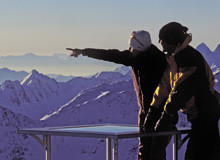M.Sc. Sport Tourism and Destination Management
Tourism is one of the most important economic sectors worldwide and sports tourism is one of the strongest trends. In response to this, the German Sport University has developed the Master's programme "Sport Tourism and Destination Management". It provides you with outstanding scientific expertise as well as a wide range of practical experience - in the fields of sport and physical activity, economics and business administration, product and service development, resource management and spatial planning.
The course of study starts every year in the winter semester and leads to the internationally recognized degree of Master of Science [M.Sc.] within four semesters. The movement-oriented basic approach clearly distinguishes it from other Master's programmes in tourism science. A particular focus is on the development of innovative offers and products for exercise, sport and recreation in established tourism destinations, in nature reserves and in urban recreation areas
Optimising of the programme in winter semester 2018/2019
The M.Sc. Sport Tourism and Destination Management course of study has been regularly optimised and adapted within the framework of ongoing evaluation processes. The result of the last evaluation and recertification of the study programme is the sharpening of the study profile with a stronger focus on sustainable destination management and innovative offer and product development. The topic of recovery continues to play an important role within the study programme. The sharper profile results in an indispensable competence-oriented access to relevant fields of work and research in national and international tourism regions. These are already the decisive professional fields for our graduates.
Quick Overview
This Master of Science is geared towards people who are interested in working in international tourist and leisure business. In addition, prospective students should be interested in working on new concepts in sport tourism, putting sustainable concepts into practice and should view interdisciplinary work as an exciting challenge
The current tourism and recreation trends necessitate a professionalisation of what is on offer in the fields of sport tourism and adventure. In accordance with these requirements the Master´s course teaches differentiated methodological, social and personal skills as well as tourism specific key qualifications in the areas of economic knowledge, ability to work in a team, leadership and decision-making skills, project development and sports facility planning.
Our training goal is to provide internationally qualified professionals who, based on solid tourism industry knowledge, have the ability to think in an interdisciplinary way and act according to the principles of sustainability.
The demand for such specialists is high. Sports tourism destinations, for example, are looking for ways to sustainably develop their offers in the face of climate change and scarce resources. Rural regions and cities are increasingly focusing on sports topics. Protected area administrations are developing offers and visitor guidance concepts for conflict-free and environmentally friendly local recreation. Health resorts and spas hope to attract new customer groups by offering attractive preventive measures in near-natural areas.
Graduates of the course of studies work for example
- as manager in tourism organisations and regional planning communities
- as entrepreneur or employee in future-oriented tourism companies
- as a consultant or head of authorities and ministries at local, regional and state level
- as tourism managers in organisations, associations, protected area administrations and nature conservation organisations
- as project developer, consultant and trainer for tourism organisations and companies
The Master's programme "Sports Tourism and Destination Management" is located at the Institute for Outdoor Sports and Environmental Research. Teaching is carried out jointly with the Institute of Sports Economics and Management and the Institute for European Sport Development and Leisure Research. International and professional input also comes from our cooperation partners, such as Management Center Innsbruck, as well as from lecturers and guest lecturers from other universities or from sports tourism and business practice.
The course of study consists of 14 modules, which are taught either across semesters or as block courses.
As a full-time course, the training is usually completed in four semesters. In the first three semesters you will learn the theoretical basics; exercises, courses and excursions serve practical application and a deepening insight into the practice. The fourth semester is devoted to writing the Master's thesis. The compact study programme requires intensive time commitment. Some courses and exams as well as the internship take place during the lecture-free period.
ECTS credit points are awarded depending on the time and content of the individual modules.
The language of instruction and examination is usually German. Some courses are held entirely or partially in English. The Master thesis can be written in German or English.
Detailed information on courses and contents as well as ECTS credits can also be found in the module handbook or the curriculum.
An internship of at least two months during the course of study is a prerequisite for the successful completion of the M.Sc. TDM. The crediting of internships already completed is to be clarified with the head or coordination of the course of study in each individual case. Compulsory internships should be completed in institutions such as public authorities, tourism organizations, tourism service providers or research institutes in Germany or abroad, which deal with the subject areas of sports or nature tourism or recreation planning.
Detailed information and the formalities of the internship report can be found in the internship regulations.
The corresponding internship agreement can serve as an internship contract in advance:
In order for the internship to be recognised, an internship certificate must be submitted to the programme coordinator. For this purpose, the presentation of the internship certificate is available:

Programme Director

Ralf Roth
| Telephone | +49 221 4982-7380 |
|---|---|
| roth@dshs-koeln.de | |
| Website | Forschungsprofil |
Programme Coordination

